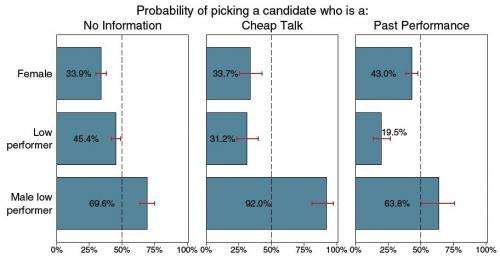March 11, 2014 report
Study shows men and women both biased against women's math abilities

(Phys.org) —A study conducted by business and economic researchers Ernesto Reuben, Paola Sapienza, and Luigi Zingales, has found that both men and women hold biases against women's math abilities. In their paper published in Proceedings of the National Academy of Sciences, the researchers describe a study they undertook using volunteers posing as either employers or job seekers and how it revealed biases that likely lead to fewer women being hired for jobs that require math abilities.
In 2008 a team of researchers analyzed the results of national standardized tests taken by 15 year old students around the world. They found that while male students as a whole tended to score higher than their female counterparts, the gap between the two narrowed to nearly zero in countries where students of both genders received equal math training. This suggested of course, that there is no inherent difference in ability between the genders.
Two of the researchers from the earlier study, Zingales and Sapienza along with Reuben decided to revisit the issue by undertaking a new study. They enlisted the assistance or nearly two hundred volunteers, some of whom served as employers looking to hire, others as those looking to be hired.
In one experiment, employers were asked to choose whom they would hire between two candidates, one male and one female, when all they had to go on was appearance. Both male and female employers chose the male candidate twice as often. In another experiment, the prospective employees were asked to describe their mathematical capabilities to the employer. The result was nearly the same. The researchers pointed out that the male job seekers tended to brag about their skills while the female seekers tended to understate theirs. In a third experiment, employers were give test scores achieved by those looking for a job and despite those scores being nearly equal, men still got the job one and half times more often.
All of the employers were also asked to take what is known as an Implicit Association Test, which reveals biases between associated items. In this case, it was a bias against women and math. The researchers found that those that showed the most bias on the test tended to be the most biased in choosing who to hire.
The study team claims their research clearly shows that a bias exists in both men and women against women and that it likely is a primary reason that so few women get hired in jobs like engineering that require a high degree of math skills and why so few women choose to go into such fields of study.
More information: How stereotypes impair women's careers in science, Ernesto Reuben, PNAS, DOI: 10.1073/pnas.1314788111
Abstract
Women outnumber men in undergraduate enrollments, but they are much less likely than men to major in mathematics or science or to choose a profession in these fields. This outcome often is attributed to the effects of negative sex-based stereotypes. We studied the effect of such stereotypes in an experimental market, where subjects were hired to perform an arithmetic task that, on average, both genders perform equally well. We find that without any information other than a candidate's appearance (which makes sex clear), both male and female subjects are twice more likely to hire a man than a woman. The discrimination survives if performance on the arithmetic task is self-reported, because men tend to boast about their performance, whereas women generally underreport it. The discrimination is reduced, but not eliminated, by providing full information about previous performance on the task. By using the Implicit Association Test, we show that implicit stereotypes are responsible for the initial average bias in sex-related beliefs and for a bias in updating expectations when performance information is self-reported. That is, employers biased against women are less likely to take into account the fact that men, on average, boast more than women about their future performance, leading to suboptimal hiring choices that remain biased in favor of men.
Journal information: Proceedings of the National Academy of Sciences
© 2014 Phys.org
















